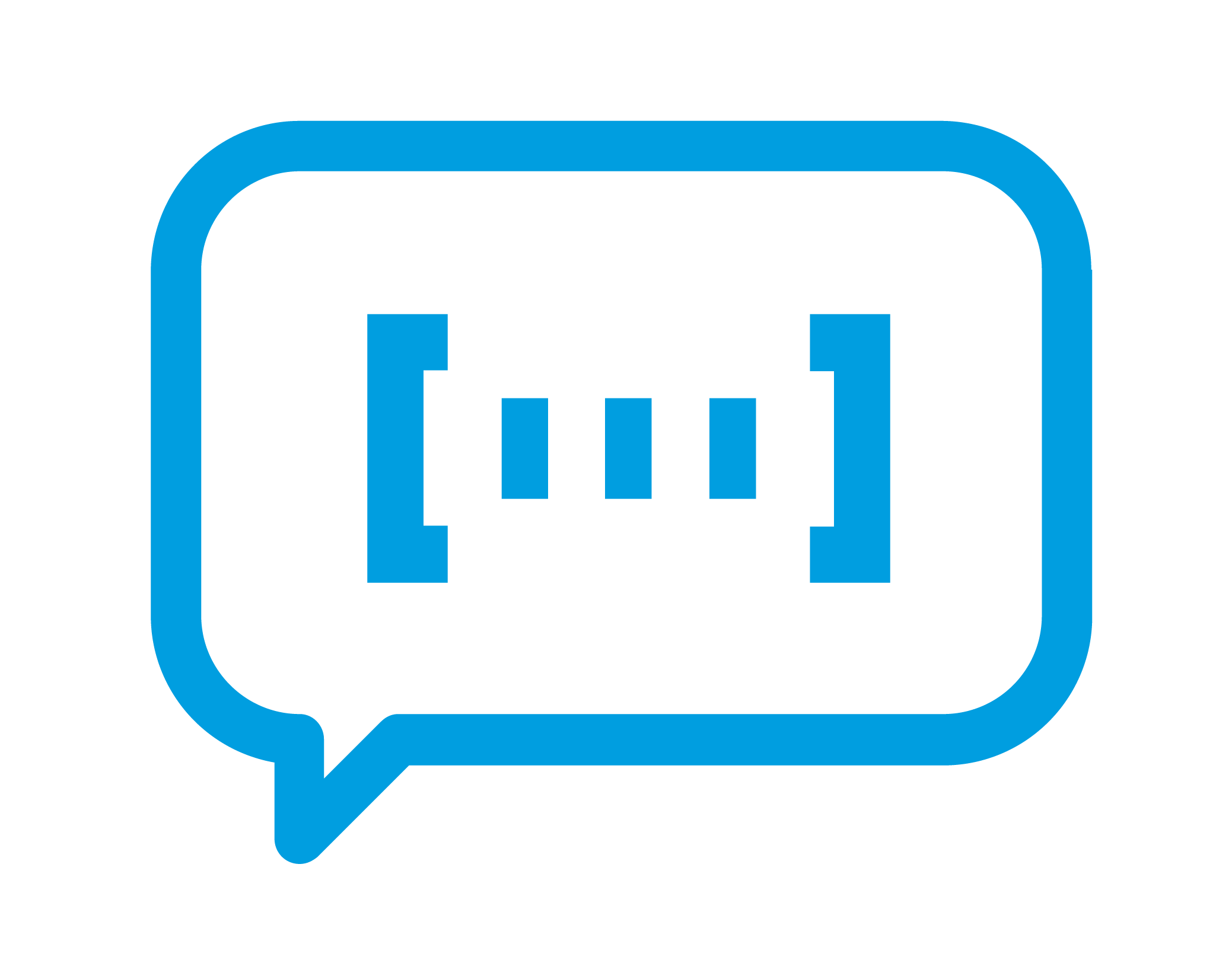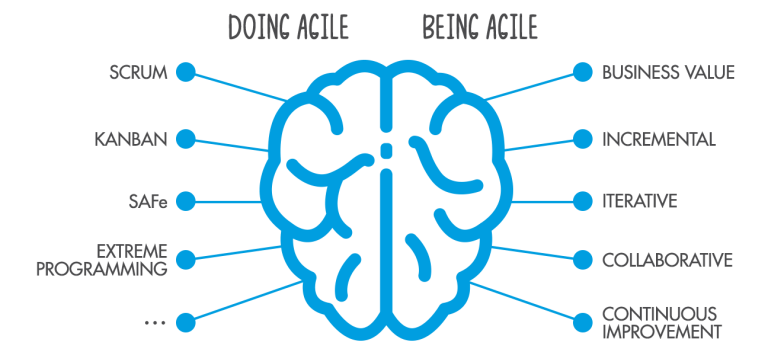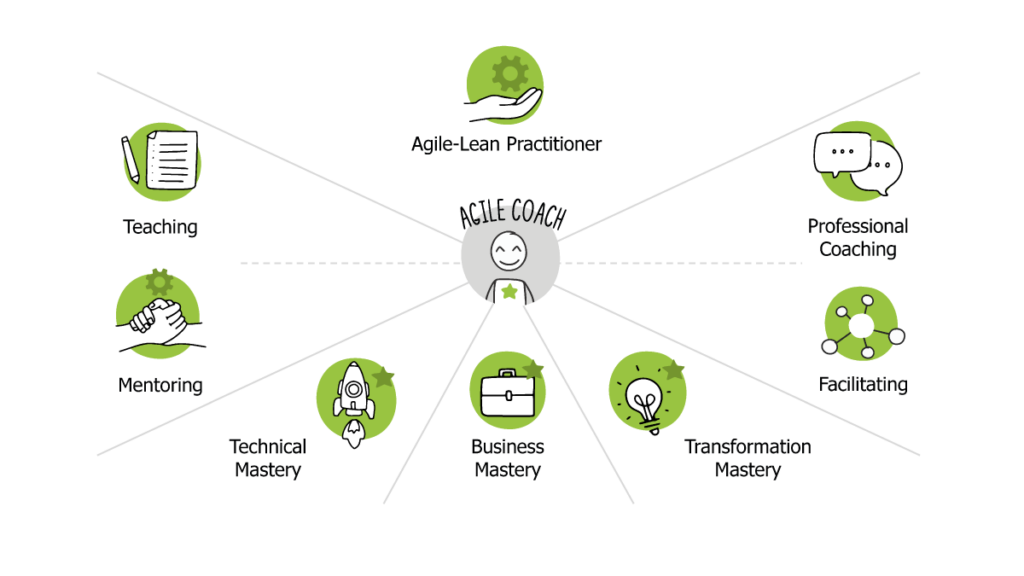What is an Agile Coach and what are their competencies?-EN
Belen Oller
- Business Agility
- Article
What is an Agile Coach?
An Agile Coach is a person who accompanies individuals, teams and organizations to implement “agility”: Their mission is to help, guide, suggest and mentor people to adopt agility both in their way of doing (frameworks, dynamics, tools) and in their way of being (mindset, values, behaviors).
The extent of the role will depend on what each organization requires or defines: it can range from working at a strategic level to implement agility at the enterprise level (end-to-end) to working at the team level, therefore, with a narrower breadth.
Whatever the case, the nature of the work does not change because what it is ultimately about is helping people and organizations adapt to change quickly and continuously. So, in the end, an Agile Coach is a Change Agent.
The competencies of an Agile Coach
One of the most widespread competency models of Agile Coaching, which we follow at Netmind, is from the Agile Coaching Institute, created by Lyssa Adkins.
It is a model that describes the areas of performance and the “know-how” that an Agile Coach is expected to possess to perform their role:
Agile-Lean Practitioner
It refers to the practical experience that an Agile Coach must have with agile frameworks (e.g., Scrum, Kanban, SAFe, etc.), but also in embodying and, therefore, reflecting in their behavior, the values that agility promotes (transparency, collaboration, openness to learning, to change, etc.).
Teaching
The competence as a Trainer requires first to have a deep knowledge of a subject and then be able to transmit it with pedagogy, in such a way as to enable learning so that people internalize the concepts and apply them in their daily tasks. Commonly, an Agile Coach’s training will be related to agile topics.
Mentoring
The mentoring competency consists of sharing knowledge, accompanying, tutoring, and advising from one’s own experience and knowledge, thus promoting people’s personal and professional growth.
Technical Mastery
Technical Mastery refers to the experience and knowledge in technical aspects required explicitly in the area being worked on. Initially, it referred to software knowledge, but nowadays, agility has been extended to all areas of the organization.
Business Mastery
Business Mastery involves knowing in depth the industry and the business that the organization is part of, focusing on what value and innovation mean for the industry in which it works.
Transformation Mastery
The Transformation Mastery requires practical experience in accompanying and catalyzing change processes, providing a systemic view. We must not forget that an Agile Coach is a Change Agent.
Facilitating
The Facilitator competency is about guiding, in a neutral way, a group of people in interaction and collaboration to arrive at solutions and make decisions.
Professional Coaching
The Professional Coaching competency involves accompanying people in a reflective and creative learning process to develop their full personal and professional potential.
The challenges faced by Agile Coaches
In addition to the competencies that this model presents, in my experience as an Agile Coach, the role also presents some challenges:
A taste of our own medicine: an Agile Coach promotes continuous improvement, technical excellence and feedback. Therefore, we also need to adopt these practices in our work. That implies having an open mind to continuously learn #alwayslearning, reflecting on how we can improve, and asking for feedback on how we are doing which requires bravery and courage because, possibly, we are not doing as well as we think we are. I think we all see ourselves in the mirror a little more beautiful than we are.
Know that we are being watched (and not because we are important): As Lyssa Adkins says in her book “Coaching Agile Teams,” They are watching: The people we work with are watching us. Therefore, we have to be an example. An example of what we preach, an example of coherence between what we say and what we do, reflecting the values of agility with our behaviors.
Do not forget to ask ourselves, “Why?”: Often, we get into the organizational inertia of the company, and we forget why we do things or, better said, why we want to be “agile.” We get lost without realizing it, and we focus on trying to implement models, processes and techniques (whatever it is!), and we forget to ask ourselves if this will take us where we want to go.
Breaking the status quo, challenging, influencing is the gasoline that we Agile Coaches have to pour on people, to mobilize them on a path that will never end, which is the continuous adaptation to change.
Develop your competencies
as an Agile Coach
Complete training to learn all the necessary skills to become an Agile Coach.
See courses


